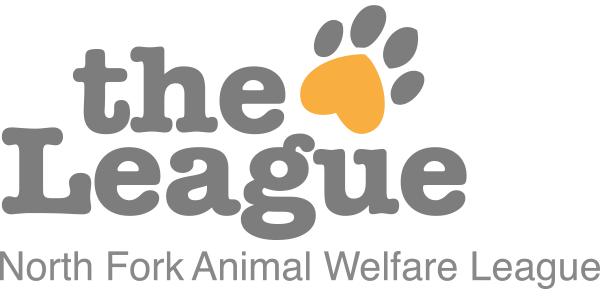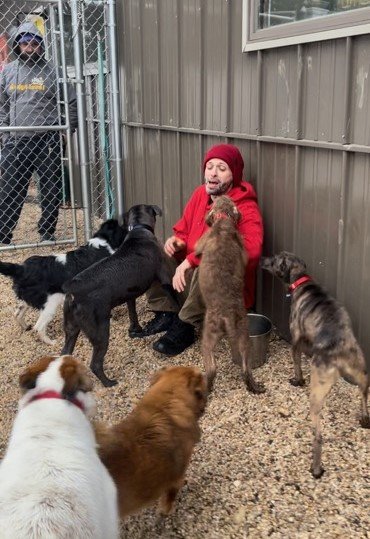It’s Canine Fitness Month!
The Importance of Physical Activity for Dogs
If you have a soft spot for animals, treat them like your own family, hold a special place for them in your heart, or even just respect them as a live creature, then you would know that ensuring their overall well-being—physical and emotional— should also be prioritized.
Just like us, animals benefit from regular exercise to maintain their overall well-being, prevent health issues, and promote longevity. Staying active significantly enhances their quality of life, from boosting cardiovascular health to fostering mental stimulation.
Thus, this April, we celebrate Canine Fitness Month—a time dedicated to highlighting the importance of physical activity for dogs of all breeds and ages. We at North Fork Animal Welfare League (NFAWL) firmly believe in the transformative power of exercise for our furry friends.
So, to spread more awareness, let’s delve into the importance of keeping our canine companions fit, especially as they age, and the profound benefits it brings to their overall well-being, and spread the word around!
Why Fitness Matters for Dogs
Dogs benefit immensely from regular physical activity. Whether it's a brisk walk around the neighborhood, a game of fetch in the backyard, or a romp in the dog park, staying active is crucial for their physical health, mental stimulation, and emotional balance.
For adult and older dogs, maintaining an active lifestyle becomes even more crucial. As our furry friends age, they may be prone to various health issues such as arthritis, obesity, and declining muscle mass. Regular exercise helps alleviate stiffness, maintains a healthy weight, and preserves muscle strength and joint flexibility, thus enhancing their quality of life and extending their years of companionship with us.
The Benefits of Physical Activity for Adult/Older Dogs
1. Joint Health
As dogs age, they may experience joint stiffness and discomfort, often attributed to conditions like arthritis or general wear and tear. Regular physical activity helps to lubricate the joints and improve circulation, reducing inflammation and promoting joint health. Activities such as walking, swimming, and gentle stretching exercises can help maintain flexibility and ease discomfort associated with aging joints.
2. Weight Management
Obesity in dogs can lead to a myriad of health problems. Although it is a common issue among adult and older dogs, that doesn’t mean you can just neglect its effect. Obesity can exacerbate the existing health conditions of your dog and lead to new ones. Regular exercise, paired with a balanced diet, is essential for maintaining a healthy weight and preventing obesity-related issues such as diabetes, heart disease, and joint problems. By keeping our dogs active, we can help them burn calories, build muscle mass, and improve their overall fitness level.
3. Mental Stimulation
Physical activity isn't just beneficial for your dog's body; it also stimulates their mind. Mental stimulation is important for preventing boredom and behavioral issues, especially in older dogs who may be less active than their younger counterparts. Immerse your dogs in activities that engage their senses, such as exploring new environments, solving puzzles, or learning new tricks. Doing so helps keep their minds sharp and wards off cognitive decline. Additionally, regular exercise releases endorphins, which promote feelings of happiness and contentment, contributing to their overall well-being.
4. Improved Cardiovascular Health
Similar to humans, dogs benefit from a healthy heart. Regular exercise strengthens the heart muscle, improves blood circulation, and enhances lung function, leading to better endurance and overall cardiovascular health. Activities that elevate the heart rate, such as brisk walking, jogging, or playing fetch, help dogs build stamina and resilience, reducing the risk of cardiovascular diseases and improving their ability to engage in daily activities.
5. Enhanced Socialization
Physical activity provides opportunities for dogs to interact with other animals and humans, promoting socialization and strengthening bonds. This is particularly important for older dogs, who may become more withdrawn or less tolerant of unfamiliar situations as they age. Participating in group activities, such as playdates, dog park visits, or supervised playgroups, allows dogs to practice social skills, learn appropriate behavior, and develop confidence in various social settings. These interactions contribute to a dog's emotional well-being and can help prevent feelings of isolation or loneliness, especially in older dogs who may be experiencing changes in their environment or routine.
In this regard, NFAWL provides enriching experiences for all dogs under our care, regardless of age or breed. Our playgroups offer tailored socialization and activity opportunities that cater to each dog's unique needs.
We understand that different dogs have varying energy levels and play styles. That's why our playgroups are carefully curated to ensure that every dog finds their perfect match. Whether it's a spirited game of tag for the young and exuberant pups or a leisurely stroll for the seniors, we see to it that each dog receives the right balance of exercise and social interaction.
Let’s pledge to prioritize the health and happiness of our furry companions not just during Canine Fitness Month but all year round. Whether it's through regular walks, engaging play sessions, or participating in playgroups, let's ensure that our dogs lead active and fulfilling lives.
Together, let's unleash health and happiness for our beloved dogs!



